- Home
- Elmore Leonard
The Moonshine War Page 13
The Moonshine War Read online
Page 13
"And you can throw your tail up in the air and hump at it," Mr. Baylor said, "because if I don't take this man in nobody does."
"You're right that time, papa," Dual said. He drew his revolver and shot Mr. Baylor three times through the chest, then emptied his gun at the windshield, at the face staring at him with eyes stretched wide open and the mouth trying to say something. "Somebody else will have to finish off Boyd," Dual said. "I'm empty."
They pushed the sheriff's car off the road and watched it roll down the slope, plowing through the brush clumps and snapping off the young trees.
Chapter Ten.
Tuesday, June 23, Son drove into town to buy meal and stores.
He went to the grocery first, where he always bought his sugar, and asked for three hundred and fifty pounds. The clerk went out into the back room and returned and said they didn't have any sugar. Through the doorway Son could see the fifty-pound bags stacked up. He said, I can see the sugar, right there.
The clerk said yes, it was sugar, but it had been special ordered by somebody and couldn't be sold to anybody else. Son asked to speak to Mr. Hanks, the owner of the store. The clerk, trying to act natural, looking Son straight in the eye, said Mr. Hanks wasn't in today.
At Marlett Feed & Seed Son ordered eight bushels of yellow corn meal, a hundred pounds of wheat bran and a fifty-pound can of lard. The manager asked if he wanted to pick it up in back. Son looked at him and said didn't he always pick it up in back? The manager said he'd tally it up then. Son told him to put the amount on his account. The manager was polite but he didn't seem to have an expression of any kind on his face. He told Son he already owed a hundred and eighty-seven dollars and he would have to pay it before he charged any more items.
"How long have I been coming in here?" Son asked him.
"I don't know. A few years I guess."
"My family's been coming in fifteen years.
All of a sudden our credit isn't any good." "It's a new policy," the manager said. "Since when?"
"We got to pay our bills too, you know." "Since when is this new policy?"
"Just recently; the past week or so."
"Since the day before yesterday," Son said. "All right, I expect you know what you're doing, because you're never going to see me in this store again."
"It's a new policy," the manager insisted.
Son went to the bank and had to wait twenty minutes for the manager to get back from his dinner, then had to wait some more while the manager sat at his desk behind the fence and looked through papers. The open room was quiet; Son was the only customer in the place. He listened to the overhead fans for a while and every few minutes heard the bank manager clear his throat.
Finally Son got up and stepped over the fence. He said, "I want to borrow three hundred dollars. You going to give it to me or not?"
The bank manager looked up at him. He didn't say hello or, well, Son Martin, how're you doing? He said, "What have you got for security?"
"A producing still," Son answered. "You know we can't accept that."
"How about forty-five hundred gallons of whiskey?"
"There's no such thing as whiskey these days," the bank manager said.
"How about my place?"
"I don't know what it's worth."
"Do you want to have somebody look at it?"
"Well, we're pretty busy right now."
Son could hear a fly close to him in the silence and the whirring of the overhead fans. He stepped over the fence and walked out.
At the Hotel Cumberland he again had to wait. The girl came out of the office to tell him Mrs. Lyons was tied up at the moment, but would be with him as soon as she could. He picked a chair away from the sunlight coming in the window and lit a cigarette. Then watched Lowell Holbrook coming down the stairs. Lowell didn't look over right away. He stood by the desk. Then when he did look over, Son was staring at him and saw his reaction; the sudden look of surprise and Lowell's eyes shifting away, but coming back now because he knew he had been caught and would have to acknowledge Son's nod. But he didn't come over until Son motioned to him.
"Howie you doing, Lowell?"
"Pretty good, I guess."
"I'm waiting on Mrs. Lyons."
"Yes, sir, I figured you were."
"She's busy doing something, I don't know what."
"Yes, sir. Well, I better get back to work." "Lowell, I wondered if I could have a glass of cold water."
"You can get one in the dining room,"
Lowell said. He crossed the lobby to the desk. Behind it, he leaned over the counter with a pencil in his hand, like he was checking a list of something. His head would come up and he would look out toward the front door, concentrating, deep in thought.
When Kay Lyons came out of the office, Lowell nodded toward Son and pointed the end of his pencil in that direction. Son watched her crossing the lobby, raising her eyebrows and putting on a little expression of surprise.
"What brings you to town?" She stood in front of him.
Son looked up at her. "Everybody's busy today. Did you know that?"
"It was something I had to finish."
"No, I mean everybody. Everybody's very busy. And serious. Boy they're busy, serious, hard-working people in town. I never realized before how busy everybody was."
"Is that what you wanted to tell me?" "No, I wanted to ask you something." "What?"
"If you'd loan me three hundred dollars." He kept his eyes on her. He watched her eyes move away and come back and saw the little raised-eyebrow look of surprise again.
"Why would you want three hundred dollars?"
"I need it."
"That's a lot."
"You told me you've got over four thousand dollars in the bank."
"Well, yes, but that's my husband's insurance money. I mean he left it to me and it's all I have."
"When we get married, is it still his insurance money?"
"That's different--listen, tell me why you need it."
"To buy stores."
"Well, don't you buy on credit?"
"Not any more. I found out today my credit's run out."
Her eyebrows closed together in a frown, then raised again. "They won't give you credit? I don't understand."
"Yes you do."
He waited, watching her, but she said nothing.
"I have to be a good boy," he said then, "and do what people want or else they start talking it over and saying, 'What kind of a neighbor is this man? He isn't any neighbor, he's only for himself and doesn't care about others.' Then they say, 'Well, a man like that sure doesn't deserve to run a credit. He won't be nice to the people he lives among, we won't be nice to him.' "
"Well?" Kay said.
"Why don't you sit down."
"I have to get back to the desk."
"Will you loan me three hundred dollars?" "I told you--it's insurance money. I have to be very careful."
"Kay, yes or no?"
"All right. No."
"Don't you think I'd pay you back?"
Kay had stopped dodging, trying to, evade him. "How would you pay me back?" she said. "Lying in a grave next to your father, how would you pay me? Would you leave it to me in your will? Three hundred dollars worth of bootleg whiskey, is that how you'd pay?"
"It's to have things out in the open," Son said, "isn't it?"
Kay sat down now, on the edge of the sofa facing his chair; her hands were locked together on her lap, but her face was relaxed now and her eyes did not wander from his.
"You know what I want," Kay said. "I want to leave here. I'll leave tomorrow if you want to go and I'll give you every cent I have in the bank. But I'm not going to give you money to help you stay here and kill yourself. Wouldn't I be foolish to do that, pay for something I don't want?"
"Kay, you're not buying me. We leave here together it's got to be when I can take what I want with us. What / want. Doesn't that mean anything to you?"
"What you want isn't possible."
&nb
sp; "I've got to find that out for sure. I'm not giving it away to anybody, not to federal people and least of all not to anybody pretending to be federals."
"What do you mean by that?"
"I don't think the ones making the raids are agents, I think they're bootleggers."
"Are you sure?"
"No, it's what I think."
"If it's true, it could be worse, couldn't it?--what they might do."
"I don't know. It's up to them."
"But either way, no matter who they are, you can't win. Because what you want isn't possible."
"That's the way your uncle and the rest of my neighbors see it," Son said, "so I guess I can't explain it to you either. But I'm staying. They'll put me under or get tired and go away, I'm staying. You want to wait around and see what happens, it's up to you."
Miley Mitchell didn't like going out to that farmhouse. She didn't like looking at the old blind man. He was depressing; the whole place was depressing and filthy dirty. The men would sit around looking at her, not being able to do anything about it. Once one of them said to her, "You ought to be upstairs and we could take our turns." And she had said, "Gee, that would be a lot of fun," and walked away from him. She could picture the old stained mattress crawling with bedbugs. No thank you. Dr. Taulbee said, then stay at the hotel if you don't like the place. They had been here nine days now and nine days were about eight too many in a town this size. Once you had walked five blocks up the street and five back and had dinner in the hotel dining room, you had been to Marlett. Sitting in the lobby had been kind of fun the first time; aware of the salesmen looking her over; though not Kay had stopped dodging, trying to, evade him. "How would you pay me back?" she said. "Lying in a grave next to your father, how would you pay me? Would you leave it to me in your will? Three hundred dollars worth of bootleg whiskey, is that how you'd pay?"
"It's to have things out in the open," Son said, "isn't it?"
Kay sat down now, on the edge of the sofa facing his chair; her hands were locked together on her lap, but her face was relaxed now and her eyes did not wander from his.
"You know what I want," Kay said. "I want to leave here. I'll leave tomorrow if you want to go and I'll give you every cent I have in the bank. But I'm not going to give you money to help you stay here and kill yourself. Wouldn't I be foolish to do that, pay for something I don't want?"
"Kay, you're not buying me. We leave here together it's got to be when I can take what I want with us. What I want. Doesn't that mean anything to you?"
"What you want isn't possible."
"I've got to find that out for sure. I'm not giving it away to anybody, not to federal people and least of all not to anybody pretending to be federals."
"What do you mean by that?"
"I don't think the ones making the raids are agents, I think they're bootleggers."
"Are you sure?"
"No, it's what I think."
"If it's true, it could be worse, couldn't it?--what they might do."
"I don't know. It's up to them."
"But either way, no matter who they are, you can't win. Because what you want isn't possible."
"That's the way your uncle and the rest of my neighbors see it," Son said, "so I guess I can't explain it to you either. But I'm staying. They'll put me under or get tired and go away, I'm staying. You want to wait around and see what happens, it's up to you."
Miley Mitchell didn't like going out to that farmhouse. She didn't like looking at the old blind man. He was depressing; the whole place was depressing and filthy dirty. The men would sit around looking at her, not being able to do anything about it. Once one of them said to her, "You ought to be upstairs and we could take our turns." And she had said, "Gee, that would be a lot of fun," and walked away from him. She could picture the old stained mattress crawling with bedbugs. No thank you. Dr. Taulbee said, then stay at the hotel if you don't like the place. They had been here nine days now and nine days were about eight too many in a town this size. Once you had walked five blocks up the street and five back and had dinner in the hotel dining room, you had been to Marlett. Sitting in the lobby had been kind of fun the first time; aware of the salesmen looking her over; though not one had worked up enough nerve to walk over and start a conversation. Even a dry-goods salesman could help pass the time. The fun would be in getting away with it without Dr. Taulbee knowing; the salesman letting her know he was a pretty slick article and not realizing he could get shot if they were caught. She had gone to the beauty parlor Friday for a wash and wave set. Saturday, Sunday, Monday, Tuesday--four days ago. She might as well go again today; get out of the hotel room before she started counting the designs on the wallpaper.
It was either while she was going down the stairs or walking across the lobby that Miley decided against the wave set. She just didn't think about it again once she saw Son Martin and the hotel woman talking. He was saying something and she was listening, at least not interrupting, not smiling either. Neither of them looked this way. The hotel woman never did smile or touch him; she got up and walked away.
Miley didn't wait for Son to notice her, she went out to the sidewalk and stood at the curb with her back to the hotel entrance. When he came out she followed him to his pickup truck; she opened the door and got in as he sat with his hands on the wheel staring at her, but she didn't look at him until she had closed the door and sat back with her hands in her lap.
Now she gave him a nice little smile that showed in her eyes and waited for him to say whatever he was going to say.
But he didn't. He didn't say a word. He looked at her for a moment, then backed into the street and drove west out of Marlett, past the stores and the church and the filling stations, past the section of old homes and trees lining the street, and out into the open sunlight of corn fields and telephone poles and shadowed hills in the distance.
Miley wasn't sure what she wanted to happen. She did feel it was working out better than she would have predicted. She had pictured Son getting mad and telling her to get out or asking her if Dr. Taulbee was sending a girl now to do his work--being grim and solemn about it--or saying something dumb, sarcastic, like this isn't a taxi, lady, or where is it I'm supposed to take you? Nope, none of that. He drove along at forty miles an hour, looking straight ahead, not saying one word and Miley felt a little excitement and settled down to see what would happen, deciding once they were out on the highway, she wasn't going to say a word either and they'd see who could hold out the longest.
What happened, after about ten minutes Son turned off the highway and came to a stop in a dense glade of trees. He helped Miley out of the pickup, helped her take off her clothes, spread his shirt on the ground for her to lie on and eased down next to her. At one point Miley said, "Oh God--" and a little while later, when he was stepping into his pants and she was looking up at him, not ready to move quite yet, she said, "I guess you win."
Son was yanking the end of his belt through the buckle. "You bet," he said.
"What're you mad about?"
"I'm not mad."
"You can tell that by your big smile." "I'm going to Corbin. You want to come?" "When are you coming back?"
"I don't know, tonight if I can get what I want in Corbin."
"God, I don't know why you couldn't." "You want to come or not?"
"I'd have to think of a good story to tell him."
"Like he doesn't know you're with me."
Miley made a face, a hint of disappointment. "Don't say anything dumb, okay? Up to now you've been perfect. I'll tell you truthfully he doesn't know where I am and he didn't put me up to this."
"Then what'd you come for?"
"I don't know. I guess just to see what you're like. Say, do you go with that woman at the hotel?"
Son hesitated. "You could say that. Why?"
"She's not your type." Miley waited, but he didn't say anything. "She's too nice for you."
"What does that mean?"
"Did you ever bring her here?
She'd die. She has to have everything nice. You can tell by looking at her."
"I better take you back."
"If you want me to go to Corbin with you, I will."
"What will you tell him?"
"I don't know. I'll say I went for a walk and got lost in the woods."
"Are you--married to him?"
Miley smiled. "You're sweet."
"You like him?"
"He's not my type but he could be worse." "Well, what're you living with him for then?"
"I guess I haven't had any better offers." Miley got up slowly and handed Son his shirt. "Would you care to make one?"
"Like I don't have enough trouble." "Maybe I could help you. I don't know." "Put your clothes on."
"Nervous?"
"Somebody's liable to come along.), "You didn't worry about that before. Come on, are you the strong silent type or aren't you?" "How could you help me?"
"Well"--Miley stepped into her skirt--
"let's see. I know enough about that big teddy bear to send him to jail for life. How's that?" "He's a bootlegger, isn't he?"
"You haven't made an offer yet," Miley said.
"He's no more with the government than I am. Neither is that little mule shooter." "Dual. Isn't he a cutie?"
"The one I'm not sure about is Frank Long."
"Well," Miley said, "make an offer and if it's any good I'll tell you about the doctor and Dual and Frank and the whole bunch." She turned her back to Son. "Zip me."
"You've told me," he said, "Just admitting there's something to tell."
She came around, standing close, her face raised to his. "Then why don't you call the police? You can't, but I could, couldn't I?"
Son touched her face, holding it in his hand. She was a good-looking girl with soft skin and nice mouth and warm green eyes. And if you let her talk any more, Son told himself, you'll begin to believe her.
He dropped her off in front of the Baptist Church, turned around, and headed for Corbin as fast as the pickup would go.
Chapter Eleven.
Tuesday evening, a little before seven, Frank Long was in his hotel room waiting for Dr. Taulbee to call or come by or do something. He had been waiting all day for Taulbee to "think over the situation." Because the window was open a few inches to get some air in the room, Long heard the people below in the street. He didn't hear actual words, only the urgent sounds of words and the sound of hurried steps on the sidewalk. Long went to the window, pressed his forehead against the glass, trying to look straight down, then raised the window and looked out, leaning over the sill.

 Charlie Martz and Other Stories: The Unpublished Stories
Charlie Martz and Other Stories: The Unpublished Stories Elmore Leonard's Western Roundup #2
Elmore Leonard's Western Roundup #2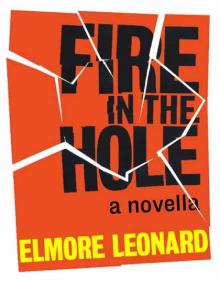 Fire in the Hole
Fire in the Hole Tishomingo Blues (2002)
Tishomingo Blues (2002)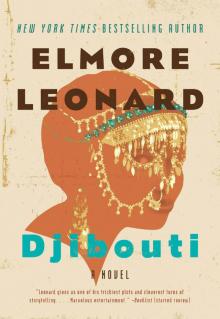 Djibouti
Djibouti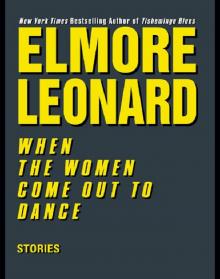 When the Women Come Out to Dance: Stories
When the Women Come Out to Dance: Stories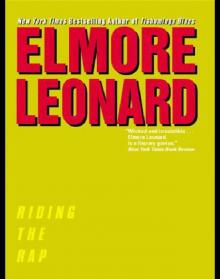 Riding the Rap
Riding the Rap Moment of Vengeance and Other Stories
Moment of Vengeance and Other Stories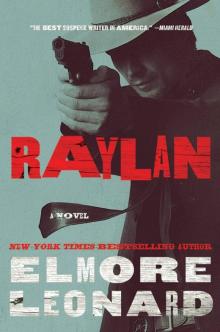 Raylan
Raylan Touch
Touch Mr Majestyk
Mr Majestyk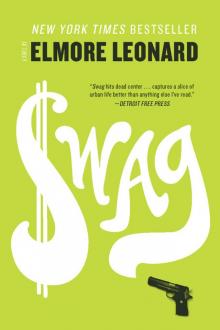 Swag
Swag Road Dogs
Road Dogs La Brava
La Brava The Hot Kid
The Hot Kid Valdez Is Coming: A Novel
Valdez Is Coming: A Novel Be Cool
Be Cool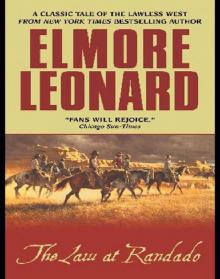 The Law at Randado
The Law at Randado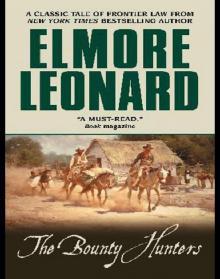 The Bounty Hunters
The Bounty Hunters When the Women Come Out to Dance
When the Women Come Out to Dance 310 to Yuma and Other Stories (1953)
310 to Yuma and Other Stories (1953)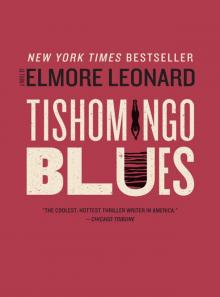 Tishomingo Blues
Tishomingo Blues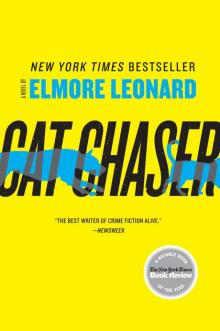 Cat Chaser
Cat Chaser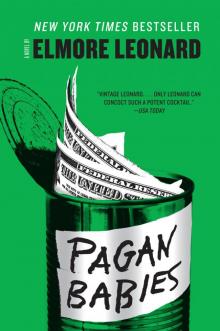 Pagan Babies
Pagan Babies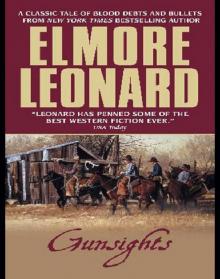 Elmore Leonard's Western Roundup #1
Elmore Leonard's Western Roundup #1 52 Pickup
52 Pickup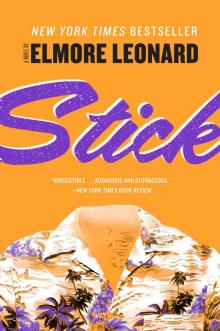 Stick
Stick The Moonshine War
The Moonshine War Valdez Is Coming
Valdez Is Coming City Primeval
City Primeval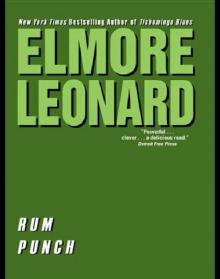 Rum Punch
Rum Punch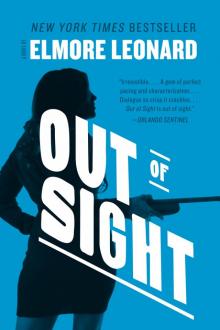 Out of Sight
Out of Sight Naked Came the Manatee (1996)
Naked Came the Manatee (1996)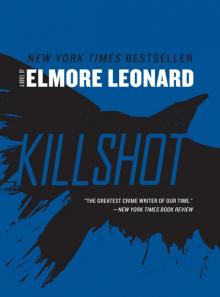 Killshot
Killshot Cuba Libre
Cuba Libre Forty Lashes Less One
Forty Lashes Less One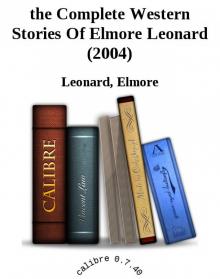 The Complete Western Stories of Elmore Leonard
The Complete Western Stories of Elmore Leonard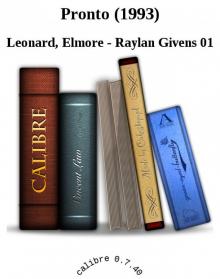 Pronto
Pronto Split Images
Split Images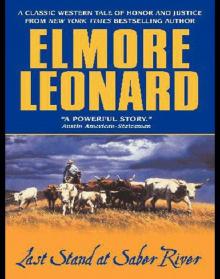 Last Stand at Saber River
Last Stand at Saber River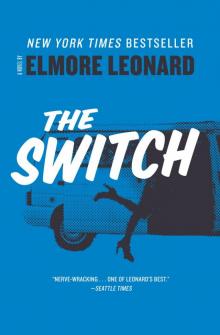 The Switch
The Switch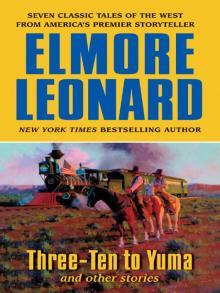 Three-Ten to Yuma and Other Stories
Three-Ten to Yuma and Other Stories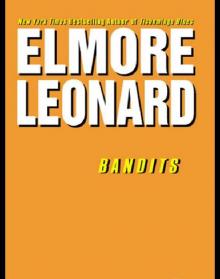 Bandits
Bandits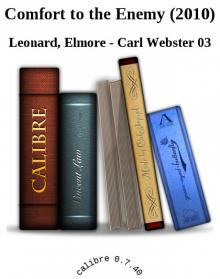 Comfort to the Enemy and Other Carl Webster Stories
Comfort to the Enemy and Other Carl Webster Stories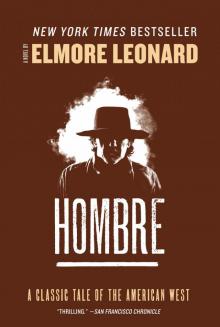 Hombre
Hombre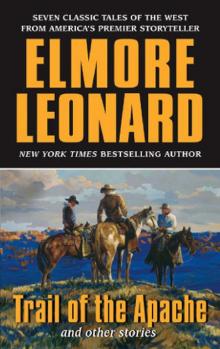 Trail of the Apache and Other Stories
Trail of the Apache and Other Stories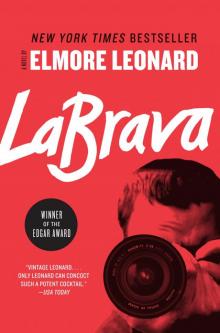 LaBrava
LaBrava Gold Coast
Gold Coast Jackie Brown
Jackie Brown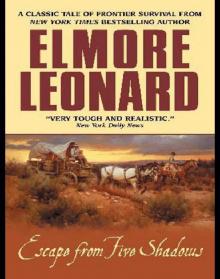 Escape From Five Shadows
Escape From Five Shadows Karen Makes out (1996)
Karen Makes out (1996)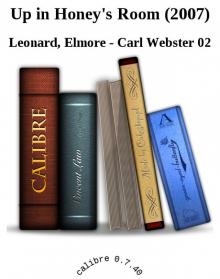 Up in Honey's Room
Up in Honey's Room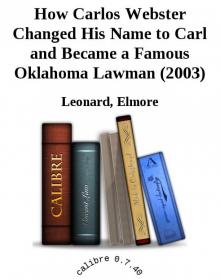 How Carlos Webster Changed His Name to Carl and Became a Famous Oklahoma Lawman (2003)
How Carlos Webster Changed His Name to Carl and Became a Famous Oklahoma Lawman (2003)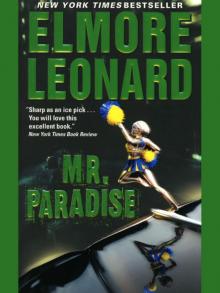 Mr. Paradise
Mr. Paradise The Hunted
The Hunted Freaky Deaky
Freaky Deaky Louly and Pretty Boy (Ss)
Louly and Pretty Boy (Ss)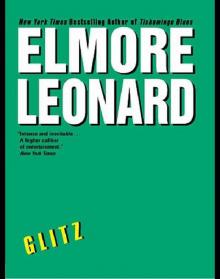 Glitz
Glitz A Coyote's in the House
A Coyote's in the House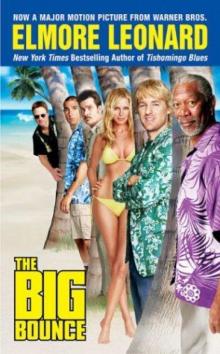 The Big Bounce jr-1
The Big Bounce jr-1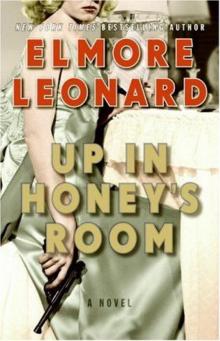 Up in Honey's Room cw-2
Up in Honey's Room cw-2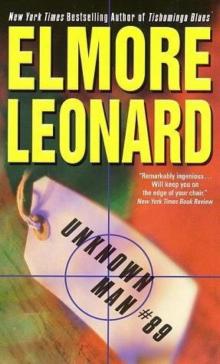 Unknown Man #89 jr-3
Unknown Man #89 jr-3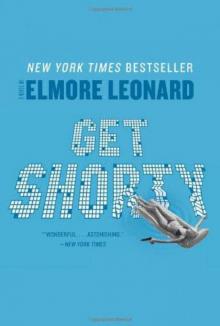 Get Shorty: A Novel cp-1
Get Shorty: A Novel cp-1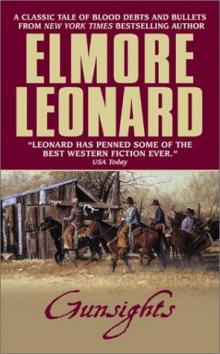 Gunsights
Gunsights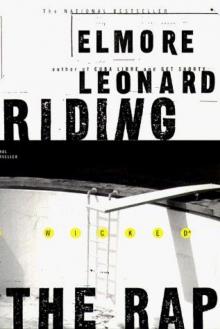 Riding the Rap rg-2
Riding the Rap rg-2